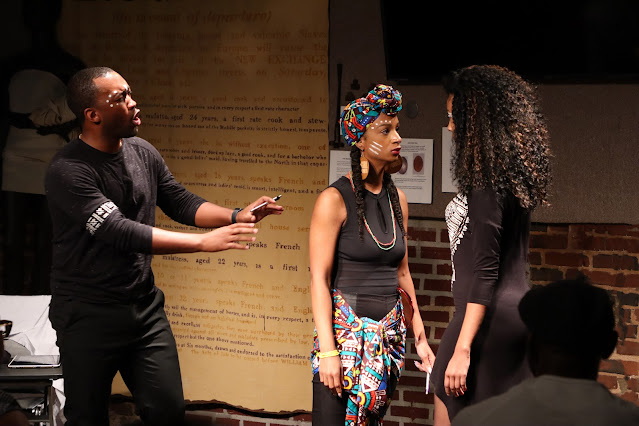A Review of Adira Dela Croix 6.0 - A Short Play Written by Anthony R Page
A Review of Adira Dela Croix 6.0
by Edward Fairley III
(Originally published in The Clayton State University Campus Newspaper)
In a world full of stories about the struggle of the average African American to find their place in a country that doesn't see them, Adira Dela Croix 6.0 opts to take a much more unique approach by flipping the coin.
Set in the future in 2096, we come to see a world where Texas has become a separate country, there are colonies on the moon in desperate need of resources, and the most pressing social issue on the table is that of "machine rights".
 |
| The Cast of Adira Dela Croix 6.0 (L-R) Dante Sellers, Devin A. Shaw, and Tatiyana Mixon. |
Our eye into one side of this issue is Denton Dela Croix, a tribal leader (according to the bio) who has found himself falling in love with his android assistant Adira. He spoils her, treating her as if she were his wife (with whom we later find he is divorced) giving her everything from an expensive new upgrade to his own last name.
As the two are lost in each other's company, we see the other side of this issue in the form of Denton's secretary To'lah. She is absolutely appalled by Denton's love for machines and technology and believes that it interferes with humanity's ability to grow and prosper. These two opposing viewpoints drive our story forward, as we come to see their disagreement rise to an impasse that brings To'lah to sign her resignation from Denton's service.
The battle of ideologies here is eerily similar to that of the black struggle for equality and rights, and it's interesting to see how quickly humanity can find something they think is lower than them and then oppress it. Denton represents a world where all life is sacred, and is as such treated with respect and given the right to participate in society no matter how machine they are. This is definitely an ideal viewpoint but one might say it is a somewhat naive one.
To'lah represents the flip side, in which the creators (humans) stand above the created and the created exist to serve their purpose and be discarded when they no longer do so. She also believes firmly in focusing on the issues of humanity and keeping beings of flesh at the top of the chain of command in their world. The truly fascinating thing here is that no one is technically proven right. It is ultimately up to the viewer to decide what ideology makes more sense to them, giving this the feeling of a story as opposed to a propaganda piece.
Anthony R. Page, the playwright of Adira Dela Croix 6.0 and mastermind behind The Blue Series - Bridges & Boundaries of which this short play is included had this to say "it's a good metaphor too for Black people, who gets to decide what it means to be human because they said we were ⅗ of a human." When asked what his biggest inspiration for this particular work was he said "people are more comfortable with their cell phones now…. Well, what does that look like in 50 years, when now your cell phone has legs and a little more advanced computer inside of it."
This production did a lot with a little, using sunglasses and a pen as its primary prop pieces and managing to fashion a world that feels like it exists in the future while keeping some of the styles and clothing choices of the past, things like dashikis, hair wraps, and facial markings. The simplicity of the set design and prop choices, along with the superb choices made by the actors on stage, really helped to sell the world and help me see what they were seeing.
That immersion and stark adherence to the world was incredibly impressive and owed to the work of the fantastic Director of the production Carol Douglas Welter. She has been quoted asking the question "what is changing change?" pulled from the line at the end of the play where Adira says to Denton "this is changing change". It is perhaps this central question that moves the characters in this story to make the choices they make.
One of the production's most interesting performances was that of Tatiyana Mixon, whose portrayal of Adira truly captured the feeling of being an android trying to understand the human emotions that she regularly interacts with and eventually begins to feel herself. She starts the story with incredible almost unbreakable poise and calm. Upon receiving that upgrade she begins to show wonder and joy, and eventually anger, emotions she is unable to immediately process, causing her to (while keeping to her programming and asking for permission) lash out in a way that is uniquely human for a creature that is supposedly seen as less than.
The struggle of blacks in America is not one exclusive to Blacks, and this play does an excellent job of presenting that struggle through the lenses of another kind of people that it would be very easy to marginalize. Through this lens, we as Blacks tell a story that isn't about us beating oppression, but rather whether or not we will inevitably become the oppressors. As a play about our future, this play presents our current humanitarian issues in a futuristic light and does a great job of it.
@TheBlueSeriesAnthology
(on both Facebook and Instagram).






.jpg)

Comments
Post a Comment